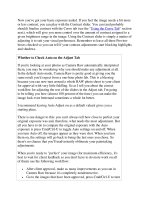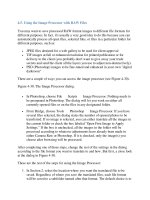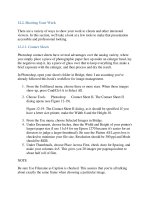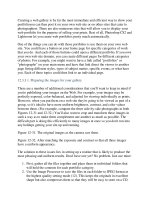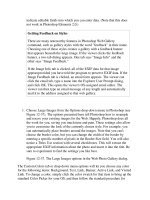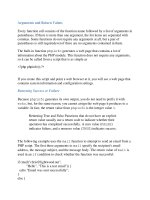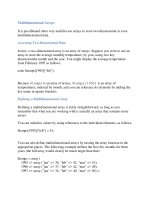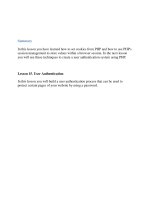Professional Information Technology-Programming Book part 1 ppsx
Bạn đang xem bản rút gọn của tài liệu. Xem và tải ngay bản đầy đủ của tài liệu tại đây (38.27 KB, 6 trang )
Digital Photography: Expert Techniques, 2nd Edition
By Ken Milburn
Publisher:
O'Reilly
Pub Date:
October 2006
Print ISBN-10:
0
-
596
-
52690
-
3
Print ISBN-13:
978
-
0
-
59
-
652690
-
0
Pages:
404
Table of Contents | Index
Ready to take digital imaging to the professional level? This advanced strategy
book offers expert advice to help you become more competent in your work
routine, but it is not your ordinary workflow book. Through step-by-step
procedures based on hard-nosed experience, professional photographer Ken
Milburn covers much more than image management. His updated edition describes
a complete workflow sequence that begins with essential photographic equipment
and digital darkroom setup, and ends once finished images are in albums, exhibits,
web sites, or publications. Milburn's goal is to make your work routine as efficient
as possible, whether you're a working professional or a passionate amateur.
Digital Photography: Expert Techniques takes you through several high-efficiency
production techniques, from non-destructive editing (adjustments to RAW photo
files that don't change or destroy any of the pixels in the original image) to
destructive techniques with Photoshop CS 2, such as changing the number,
location, brightness and color of the individual pixels. All the while, Milburn
emphasizes minimizing destructive edits and always maintaining the ability to
back to early stages. This new edition offers:
The first book to fully address non-destructive, start-to-finish, layered
workflow; including learning to take advantage of Camera Raw's non-
destructive image adjustments and adjustment layers.
Each chapter begins with a summary on how the chapter fits the workflow
and why.
Every exercise begins with side-by-side before-and-after photos. Get a
visual idea of what you will accomplish before taking the time to read.
Learn to eliminate useless images and maximize image preservation,
organization, and distribution.
Milburn's book features a preview of Adobe Lightroom, the beta application that
helps you view, sort, and rank images quickly. You'll also learn advanced
techniques with Photoshop CS 2 and Photoshop Elements, though this isn' t a
typical Photoshop how-to book. Milburn's workflow strategy includes everything
you must do before, during, and after the editing process to ensure that high-
production jobs are done professionally with a minimum of frustration. With
Digital Photography: Expert Techniques, you'll become a better (and more
profitable) photographer.
Digital Photography: Expert Techniques, 2nd Edition
By Ken Milburn
Publisher:
O'Reilly
Pub Date:
October 2006
Print ISBN-10:
0
-
596
-
52690
-
3
Print ISBN-13:
978
-
0
-
59
-
652690
-
0
Pages:
404
Table of Contents | Index
Digital Photography Expert Techniques, Second Edition
introduction Introduction
Chapter 1. A Plan for Nondestructive Workflow
Section 1.1. Getting the Camera Ready
Section 1.2. Computer Equipment and Configuration
Section 1.3. Image Downloading
Section 1.4. Winnowing Your Shoot
Section 1.5. Backing Up Originals
Section 1.6. Presentation for Client Approval
Section 1.7. Preliminary Editing
Section 1.8. Final Output
Chapter 2. Be Prepared
Section 2.1. Pre-Set Your Camera
Section 2.2. Take Along the Basic Accessories
Section 2.3. Know When Not to Shoot RAW
Section 2.4. Start in Program Mode
Section 2.5. Light Metering Tricks
Section 2.6. Tricks for Steady Shooting
Section 2.7. Stop the Action
Section 2.8. Go Where Few Have Gone Before
Section 2.9. Collect Backgrounds, Clouds, and Stuff
Section 2.10. Calibrate Your Monitor
Chapter 3. Bridging the Gap
Section 3.1. How Bridge Differs from the Browser
Section 3.2. Customizing Workspaces
Section 3.3. Working in Bridge
Section 3.4. Using Bridge for Winnowing the Shoot
Section 3.5. Add Metadata for the Record
Section 3.6. Ranking Images in Bridge
Chapter 4. Streamlining Camera Raw
Section 4.1. Save to DNG
Section 4.2. Leveling and Cropping in Camera Raw
Section 4.3. Understanding Camera Raw's Tabs
Section 4.4. Automating in Camera Raw
Section 4.5. Using the Image Processor with RAW Files
Section 4.6. Differences in Camera Raw in Photoshop CS2 and Photoshop
Elements 4
Section 4.7. Opening and Adjusting Multiple RAW Files in Photoshop CS2
Section 4.8. Using Camera Raw for Creating Effects
Chapter 5. Nondestructive Layering
Section 5.1. A System of Layers for Nondestructive Editing
Section 5.2. Layer Abbreviations in Filenames
Section 5.3. What the Layers Palette Looks Like for All Stages
Section 5.4. The Magic Action for Layered Workflow
Section 5.5. Using Layer Options
Section 5.6. What You Can Do with Adjustment Layers
Section 5.7. Things You Can Do to Modify a Layer
Section 5.8. Grouping Layers
Chapter 6. Nondestructive Overall Adjustments
Section 6.1. The Basic Levels and Curves Routine
Section 6.2. Adjustment Layer Advantages
Section 6.3. Using Blend Modes on Adjustment Layers
Section 6.4. Changing Hue/Saturation
Section 6.5. Color Balance Techniques
Section 6.6. Applying Color Balance Techniques to Other Images
Section 6.7. Making Destructive Adjustments on the Layers
Chapter 7. Making Targeted Adjustments
Section 7.1. Tips for Using Selections
Section 7.2. Using Layers to Make Targeted Adjustments
Section 7.3. Creating Effects with Targeted Adjustments
Chapter 8. Repairing the Details
Section 8.1. General Repair Toolkit
Section 8.2. Specific Types of Repair Projects
Chapter 9. Collage and Montage
Section 9.1. Where to Find the Pieces for Your Collage or Montage
Section 9.2. Making a Collage
Section 9.3. Photoshop Features Especially Useful for Making Montages
Section 9.4. Matching a Knockout to Its Background
Chapter 10. Creating the Wow Factor
Section 10.1. Organizing Your Layers to Apply Effects
Section 10.2. Applying Filter Effects
Section 10.3. Using the Filter Gallery
Section 10.4. Blurring Memories
Section 10.5. Satisfaction in Liquefaction
Section 10.6. Using the Warp Tool
Section 10.7. Using Lighting Effects
Section 10.8. Homemade Backgrounds
Section 10.9. Colorization Effects
Section 10.10. Pattern Overlays
Section 10.11. Photo Filters
Section 10.12. Film Effects
Section 10.13. Monochrome Effects
Section 10.14. Sharpening
Chapter 11. Special Purpose Processing
Section 11.1. Stitching Images for a New Point of View
Section 11.2. Extending Dynamic Range
Section 11.3. Converting Photos to Paintings
Chapter 12. Presenting Your Work to the World
Section 12.1. Printing Your Digital Images
Section 12.2. Showing Your Work
Section 12.3. Promoting Your Images on the Web
Section 12.4. Create a Digital Slide Show
Section 12.5. Saving a Digital "Positive"
Appendix A. Workflow Alternatives
Section A.1. Capture One Pro
Section A.2. Raw Shooter
Section A.3. Aperture
Section A.4. Adobe Lightroom
Section A.5. iView Media Pro
About the Author
Colophon
Index
Digital Photography Expert Techniques, Second Edition
by Ken Milburn
Copyright © 2007, 2004 O'Reilly Media, Inc. All rights reserved.
Printed in Italy.
Published by O'Reilly Media, Inc., 1005 Gravenstein Highway North, Sebastopol,
CA 95472.
O'Reilly books may be purchased for educational, business, or sales promotional
use. Online editions are also available for most titles (safari.oreilly.com). For more
information, contact our corporate/institutional sales department: 800-998-9938 or
Print History:
March 2004: First Edition.
October 2006: Second Edition.
Editor: Colleen Wheeler
Production Editor: Genevieve d'Entremont
Copyeditor: Laurel Ruma
Indexer: Johnna VanHoose Dinse
Cover Designer: Mike Kohnke
Interior Designer: David Futato
Illustrators: Robert Romano and Jessamyn Read
The O'Reilly logo is a registered trademark of O'Reilly Media, Inc. The Digital
Studio series designations, O'Reilly Digital Studio, Digital Photography Expert
Techniques, and related trade dress are trademarks of O'Reilly Media, Inc.
Many of the designations used by manufacturers and sellers to distinguish their
products are claimed as trademarks. Where those designations appear in this book,
and O'Reilly Media, Inc. was aware of a trademark claim, the designations have
been printed in caps or initial caps.
While every precaution has been taken in the preparation of this book, the
publisher and author assume no responsibility for errors or omissions, or for
damages resulting from the use of the information contained herein.
0-596-52690-3
978-0-596-52690-0
[L]


